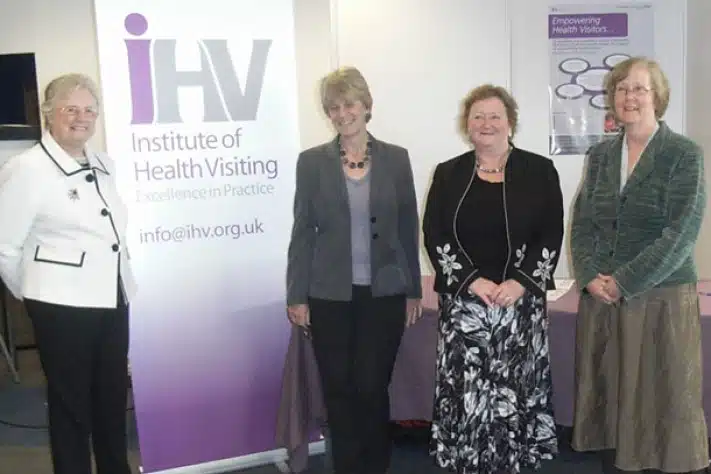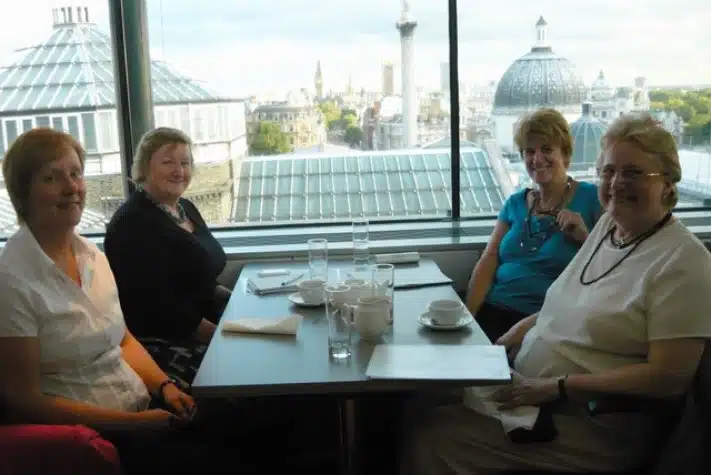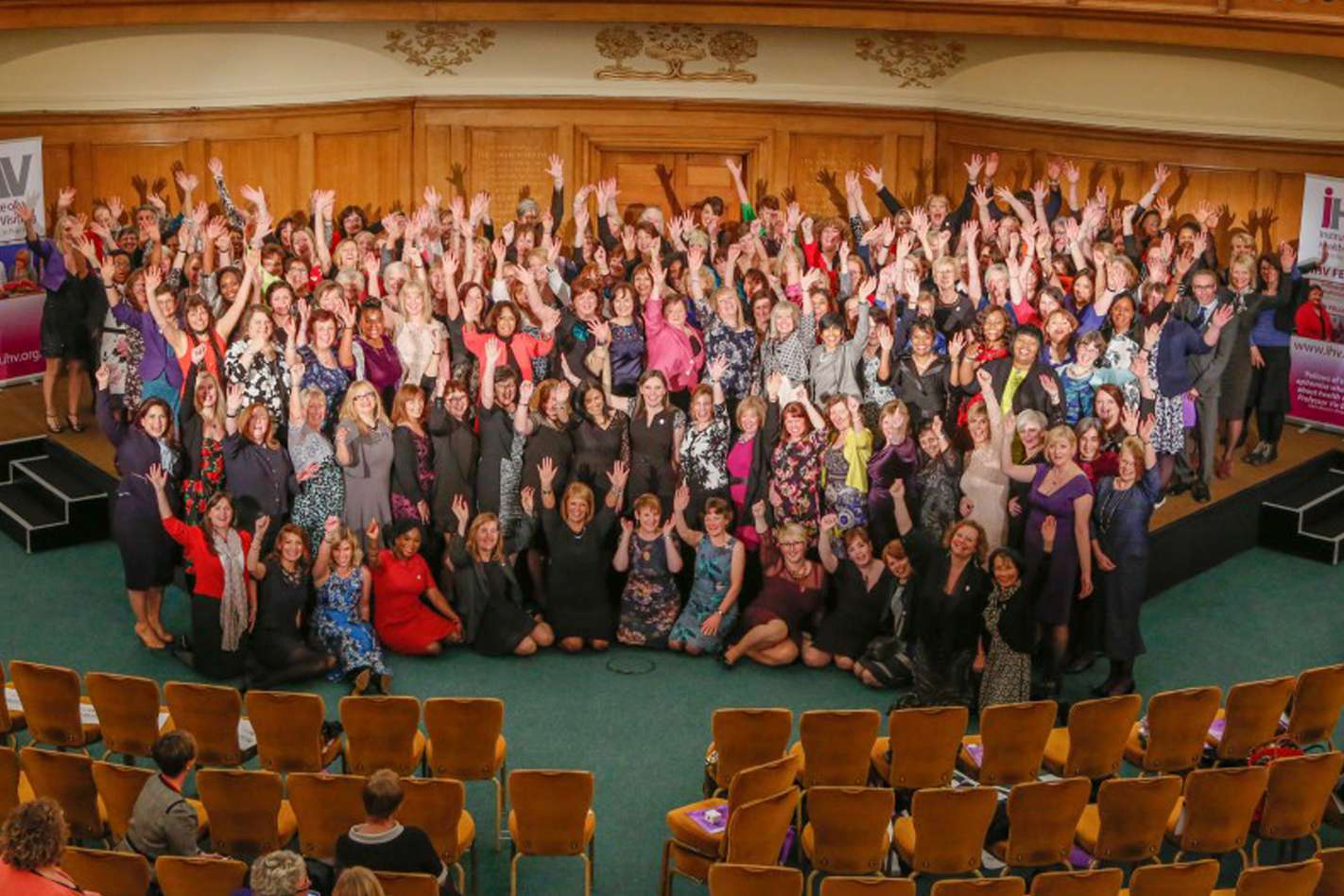5th December 2022
This week is a week of celebration for the Institute of Health Visiting (iHV), as 2022 marks its 10th anniversary. To get the week started, Dr Cheryll Adams CBE, iHV Founder and first Executive Director (December 2012 – March 2021), publishes a brief overview of the history of the iHV.

Founders and Trustees, from left: Professor Dame Sarah Cowley DBE, Professor Sally Kendall MBE, Dr Cheryll Adams CBE, Professor Ros Bryar
The Institute of Health Visiting (iHV) was launched on 28 November 2012, following over two years of planning.
Many senior health visitors had long felt that the profession needed its own standalone academic body: to provide national standards for the profession and to develop its evidence base. In 2010 the time felt right to turn this vision to reality, when the new coalition government committed to increase the number of health visitors by 50% within five years.
Dr Cheryll Adams CBE convened a meeting with three eminent academic colleagues: Professors Dame Sarah Cowley DBE, Ros Bryar and Sally Kendall MBE. Together, they brainstormed how to establish an academic body – both led by and run for the health visiting profession. The ultimate goal was to provide health visitors with the support they need to work optimally – so as to maximise the benefits of the profession to the lives of babies, children and their families.

From left: Professor Ros Bryar, Dr Cheryll Adams CBE, Professor Sally Kendall MBE, Professor Dame Sarah Cowley DBE
After discussing many different options, they agreed to proceed with the institute model, as this would be more straightforward than trying to establish a new College. However, to set up an Institute outside of a university requires ministerial approval. Thus, the team first formed a feasibility group, putting the idea out to national colleagues to see if the concept of a new academic body for health visiting was indeed of interest. The feedback was overwhelmingly positive! A meeting with then-health minister Ann Milton MP quickly followed and she gave the idea her enthusiastic blessing. Planning commenced!
Three of the four members of the initial steering group had full-time jobs, so much of the planning of the Institute took place in evenings and weekends.
A crucial initial step was to share the idea with members of the profession, who would be the main users of Institute products. After more incredibly positive feedback from practitioners, educationists and leaders, the challenge of establishing a new organisation began.
Fortunately, the steering group found that, collectively, they had many friends and supporters who could offer advice and support. Principal among these was the Royal Society for Public Health (RSPH), whose CEO generously provided access to the expertise of his senior team, as well as to their meeting rooms. There was, briefly, even discussion of the iHV being established as an affiliated organisation within the RSPH. However, following legal advice, the steering group decided to persevere with establishing an independent entity – although recognising that this would be considerably harder to set up.
A lucky break came when Dame Sarah was invited to a meeting at No10, to discuss health visitor education and what needed to be done to strengthen it. She asked to take Dr Adams along and, by the end of the meeting, they had a request for a business plan from some very enthusiastic civil servants. Ultimately, this led to the Institute receiving seed funding from the Department of Health – which helped the team to work through all the steps necessary before their idea would be ready to launch.
After many months of challenging decisions – including choosing a legal model, branding, and what form the website should take – by Autumn 2012, the Institute was finally ready to be launched as a new charity. The official launch was held in RSPH’s Portland Place reception rooms and was a glittering event. It was an opportunity to share the Institute’s vision far and wide; to thank all who had contributed to its journey thus far; also to appoint the Institute’s first Honorary Fellows.

From left: Professor Ros Bryar, Professor Dame Sarah Cowley DBE, Professor Sally Kendall MBE, Dan Poulter MP Parliamentary Under-Secretary (Department of Health), Sally Russell OBE iHV Chair, Dr Cheryll Adams CBE at iHV Launch event at RSPH’s Portland Place – 28 November 2012
The Institute now had a management board to support it, holding its first legal meeting in December 2012. Sally Russell OBE, co-founder of Netmums, was appointed as the Institute’s first chair – bringing to the position a huge and credible passion for the role of the health visitor. Also on the founding board was Peter Bennett – then-CEO of the charity lawyers BWB, who had helped to prepare the Institute’s Charity Commission application – as well as Professors Cowley, Bryar and Kendall. Dr Adams became the organisation’s Founding Director.
The Institute began its first year with an empty bank account. As agreed, the seed funding had been spent to bring the idea to launch and, without sponsors or other benefactors, it was up to the Institute to develop its own funding streams – fast! What’s more, as the fledgling Institute was yet to submit charity accounts, it could not yet apply for funding from charitable foundations.
An Associate membership scheme was introduced and proved popular, with 1,500 health visitors signing up to the Institute in the first year. The Institute also won a bid to train 400 health visitors in postnatal depression (Dr Adams’ specialist area). The Institute’s bid suggested training the attendee health visitors as Champions for the topic, equipping them with the skills to then disseminate their training to colleagues – so it could reach more people. This was the start of one of the Institute’s most successful initiatives. Since then, thousands of health visitors and others have been trained by the iHV as Champions of different topics – reaching perhaps tens of thousands of their colleagues as a result. From this positive start, the Institute team continued to win grant funding from different sources, as they do to this day.
In early 2014, the Institute appointed its first two contracted staff. Amazingly, by the end of that same year, the team had grown to 38 – thanks to a rush of projects! The coalition government now had just months left to deliver its promises for strengthening the health visiting profession, and opportunities for project funding were significant. However, these opportunities all had a very tight timescale, requiring completion by the end of March 2015.
While this really tested the fledgling Institute, many senior health visitors and others were invested in the Institute’s vision and made themselves available for secondments of six or nine months. Excellent project managers were also recruited and, incredibly, everything was delivered on time and to the Institute’s high-quality and evidence-based standards. Among the most exciting of these projects was an opportunity to create the first 150 Fellows of the iHV, who would become leaders for the health visiting profession in their local areas.

iHV Fellows celebrating their conferment
By April 2015, the government’s policy interests had moved away from health visiting, triggering a decline in funding opportunities and the loss of much of the Institute’s temporary team. A few staff stayed on to lead different streams of activity. However, they were required to bring in sufficient income to cover their annual salary, as well as some of the Institute’s central costs. Impressively, they took on the challenge! Their efforts were fundamental in helping the Institute to become established as a self-sustaining body in the following years – through membership, training and projects.
By 2022, the team had risen again, to 29 full and part-time staff. Central to the Institute’s way of working has been to employ mostly home-based staff – meaning candidates can be recruited based on their expertise alone, rather than on their ability to access a central office. Most Institute meetings take place online, with in-person meetings hosted in rented rooms. This allows the organisation to dedicate more funding to projects, rather than paying for a permanent London base. This model also meant the Institute was less initially impacted by COVID-19 than many other organisations.
The Institute’s face-to-face training programmes and conferences were, though, significantly affected by the pandemic. However, the resourceful team quickly started to test out online gatherings with external and internal speakers, and soon all the training had been moved online. In fact, this move extended the Institute’s reach overall, and many activities continue to be delivered online so that those unable to travel for meetings are not disadvantaged. The Institute’s training is now accessible to health visitors in remote areas of Scotland, for example.
Over the years, the Institute’s Associate Membership has grown steadily. Corporate membership has also become popular, allowing employers to buy membership for the health visitors they employ. The Institute’s training has received not only national, but also international recognition through awards. Furthermore, the Institute’s projects have supported the extension and sharing of evidence-based information, through varied training programmes and publications on many subjects including perinatal and infant mental health, working with neonatal families, professional leadership, nutrition, and emotional wellbeing at work.
Each year the Institute has diversified its offerings further. Films have been made, dozens of conferences and webinars run, and the team’s expertise is constantly sought-after in a range of national forums. Working in partnership with subject experts and other stakeholders has always been core to the Institute’s approach – and success! These national and local partnerships are much valued. In recent years, significant efforts have been made to also bring the users’ voices into projects and training, and this has proved to be one of the Institute’s most powerful and beneficial developments. It ensures that the project outcomes reflect the needs of those who will benefit from them.
The breadth and depth of Institute activity is captured in each Annual Report. These are recommended reading for those interested in exploring the detail of the Institute’s many activities further! iHV Annual Reports are available here.
In December 2020, the Institute commenced a period of transition, with Dr Adams stepping back from her day-to-day leadership of the organisation, prior to her retirement in March 2021. Alison Morton, one of the Institute’s first Fellows and Director of Policy and Quality, was appointed as Acting Executive Director in January 2021, with formal appointment as the iHV’s successor to Dr Adams in April 2021. It was a smooth handover and the Institute continues to develop and thrive under Alison’s leadership.
After such a full first 10 years, the only question remaining is… Where will the iHV be in 2032? Watch this space!
Dr Cheryll Adams CBE, iHV Founder and first Executive Director (December 2012 – March 2021)
December 2022

